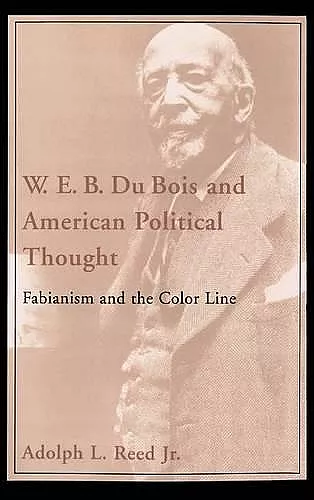W.E.B. DuBois and American Political Thought
Fabianism and the Color Line
Format:Hardback
Publisher:Oxford University Press Inc
Published:11th Dec '97
Currently unavailable, and unfortunately no date known when it will be back

This groundbreaking study of W.E.B. DuBois simultaneously analyses the political thought of one of the leading black American intellectuals and activists of this century, provides a model for the study of the history of political thought, and by examining recent DuBois scholarship, offers a penetrating interpretation of contemporary black thought. The book departs from existing DuBois scholarship by locating the sources of DuBois's thinking in the cauldron of reform-oriented American intellectual life at the end of the nineteenth century, and follows through the course of his career the ways that his early commitments persisted in his basic views regarding such pivotal issues as the relation of science and progress, social stratification among black Americans and in general, and rational social organization. While DuBois's substantive political programmes changed over time, for example in his support for defensive organizing behind the walls of segregation during the 1930s and his rapprochement with the Communist left in his last two decades, Reed argues that those changes do not reflect fundamental shifts in the structure of his thinking but were pragmatic responses to concrete political circumstances. When situated within their own constitutive contexts, these changing responses reveal their compatibility, if not coherence, with DuBois's basic, essentially Fabian socialist world view as first elaborated in The Philadelphia Negro. W.E.B. DuBois and American Political Thought's interpretation of DuBois is also an argument about the fundamental connections between Afro-American political debate and broader patterns of political discourse. This argument is linked to a path-breaking critique of dominant tendencies in Afro-American intellectual historiography and their ideological foundations, as well as to a sophisticated argument in support of an alternative, historically generativist approach to the study of the history of political thought.
W. E. B. Du Bois is a towering figure of central importance in American political thought, and so he has been annexed to many positions alien to his own. Reed provides the most informed, insightful, and balanced account of Du Bois's thinking yet written, one that is profoundly illuminating for progressive thought and action on issues of racial, political, and economic equality today. * Rogers M. Smith, Yale University *
Adolph Reed's book is quite simply brilliant. It liberates Du Bois scholarship from a host of disfiguring anachronisms. By persuasively establishing the specific intellectual context within which Du Bois worked, Reed systematically reinterprets the meaning and significance of Du Bois's most influential writings. The logic is searing, the scholarship is impeccable, and, as always with Reed, there's a bristling polemical punchline as well. Anyone who takes Du Bois seriously must come to terms with this book. * James Oakes, Northwestern University *
An extremely important contribution. Not only does Reed critically reclaim Du Bois as part of the traditions of both African American and American political thought, but he also locates Du Bois's thought and work in the dynamic changes in the political economy and racial politics of late 19th and 20th century America. Reed's book will be discussed and argued about for years, both for its provocative account of Du Bois's lifework and for its capacity to inform not only contemporary political debate, but also contemporary political action. * Michael C. Dawson, University of Chicago *
Reed has never been a man to go with the cultural flow. At a time when too many intellectuals, both black and white, are trimming their views to the rightward and depoliticizing winds of current fashion, Reed offers a bracing defense of a radical alternative. Tough-minded and wide-ranging, this book is not merely a rigorous contextualization of Du Bois that, in challenging conventional contemporary appropriations of him, will have to be taken account of by all serious future Du Bois interpretation. It is also a stirring call for a renewed Afro-American politics and scholarship that does not pass off covert quietism as activism and racial vindicationism as analysis. * Charles W. Mills, University of Illinois, Chicago *
This controversial book offers more than a challenging and well- researched interpretation of the legacy of Du Bois. In its most explosive pages Reed measures present-day public intellectuals" against the standard set by Du Bois, and it is clear that he finds the current generation wanting. This book is certain to stimulate much probing discussion and considerable soul-searching.. * Wilson J. Moses, Pennsylvania State University *
ISBN: 9780195051742
Dimensions: 241mm x 159mm x 22mm
Weight: 612g
296 pages